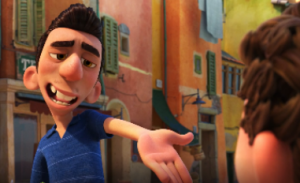104 Luca (2021)
Socioeconomic Class Discrimination in Luca
By Krystal Ibarra
As a kid that was born in the early 90’s I have a soft spot for Pixar, and once I heard that there was some influence from studio Ghibli I was sold. While Luca ended up being very lighthearted, it does a great job at normalizing that everyone is different and that you shouldn’t hide who you are just because a few people will have a problem with it. Ultimately the most important people will be the ones to accept you for you. The focus of this essay is discrimination due to economic status. This is something that is seen throughout this movie, and as we move along, I will be pointing out scenes that I think point to the discrimination of Luca, Giulia, Alberto, and even Massimo. This is a topic of discrimination that I feel can be overshadowed by some of the more blatant forms of discrimination, but unfortunately affects millions.
Let’s go ahead and start with Giulia. She was the only female character in the movie that was close to the same age as Luca and Alberto, there were other female characters, but they were Luca’s Mother and Grandmother. In this town, Giulia sticks out like a sore thumb because of her red hair and her family’s economic status. Giulia is also the only human child in the film who is seen working. When she is first introduced, she is seen on her bike pulling a cart behind her, dropping off orders. This contrasts with the rest of the kids who are playing soccer in the town square. On several occasions, she is seen either making deliveries or leaving to go make her round of deliveries. It’s also stated in the film that her parents are no longer together and that Giulia lives with her mother in another city during the school year. This I’m sure leads to other financial struggles for her father since he is the person bringing in the catch to sell to his customers. Before being introduced to Massimo there is a shot that shows their home, and the bottom of the two-story home looks to be a fish shop. I would assume that Giulia’s mother would have run the shop when her parents were together.
I noticed that There was an economic difference between Massimo and the other fishermen within the village. Massimo owned a smaller boat compared to the other fishermen seen throughout the film. In fact, in the film it was comical how small the boat was for how big Massimo is.

Adding to evidence of Massimo’s economic status within the community, Massimo’s home is older and more warn down than what you are first introduced to when first seeing the town. The paint both on the outside and the inside was chipped, their electricity ran along the outside of the wall suggesting that the house was built prior to electricity being common in homes. This also points to that there haven’t been any major improvements to the house, likely because it is not something Massimo can afford.
All the furniture was mismatched in the kitchen or made from old crates, again pointing towards the fact that they are a low-income family. This difference is also seen with Luca and Alberto, since they literally walked out from the bottom of the sea, and consequently don’t have anything except for the clothes on their backs. Throughout all the movie they are seen without shoes and other characters even comment saying that they got their clothes off a dead body and begin taunting Luca saying that he smells.

When being first introduced to the antagonist, there is a shot where the camera angle is slightly pointed up towards the antagonist’s face. This provides the viewer with Luca’s Point of view and highlights Luca’s feelings of intimidation and the antagonist’s perceived position of superiority due to his financial status and age. On page 551 of Psychology 12th edition written by David Myers and C. Dewall, they define social cognitive perspective as “behavior as influenced by the interaction between peoples traits (including their thinking) and social context.”. Throughout this movie we see the antagonist behaving in a way that places him in a position of superiority purely by throwing his weight and social influence around. His behavior is fed by his own stereotypes against low-income families and thus sees it acceptable to bully Luca Alberto and Giulia.
Something important to point out is that there is prejudice when it comes to people of lower class or economic standing, there are stereotypes that label them as untrustworthy, lazy, and even dangerous. This thought is fed by the just-world phenomenon, that of low economic status are uneducated, lazy, and are more likely to be substance abusers, and thus get what they deserve. I find it interesting that the obvious person with money in this film is the one who ends up being untrustworthy, lazy, violent, and maniacal. I think this is a good way of Pixar pointing out that your economic status/social class does not equate to a person’s worth in society. This is shining a spotlight onto the discrimination against poor people/communities, albeit a small spotlight, but a spotlight nonetheless.
REFERENCES
Crashcourse. “Prejudice and Discrimination: Crash Course Psychology #39.” YouTube, YouTube, 17 Nov. 2014, www.youtube.com/watch?v=7P0iP2Zm6a4.
“JUST THE FACTS: Poverty Myths & Stereotypes.” Just Harvest Action Against Hunger, Just Harvest, Jan. 2015, www.justharvest.org/wp-content/uploads/2015/07/Just-Harvest-Poverty-Myths-Stereotypes-fact-sheet.pdf.
Myers , David G, and C. Nathan DeWall. Psychology. 12th edition ed., Worth Publishers Macmillan Earning, 2018.
Scott, A. O. “’Luca’ Review: Calamari by Your Name.” The New York Times, The New York Times, 17 June 2021, www.nytimes.com/2021/06/17/movies/luca-review.html.
“Social Class Prejudice. Prejudice in the Modern World Reference Library.” Encyclopedia.com, Encyclopedia.com, 16 Aug. 2021, www.encyclopedia.com/social-sciences/news-wires-white-papers-and-books/social-class-prejudice.

